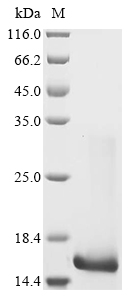The recombinant human IL21 protein, containing a C-terminal 6xHis tag, is expressed in E. coli for ease of production and purification. The IL21 gene fragment (30-162aa) is co-inserted into an expression vector with the tag gene and introduced into yeast cells. The transfected yeast cells are induced to express the target IL21 protein by adding IPTG. The IL21 protein is then harvested through cell lysis. Ni-NTA affinity chromatography is utilized to purify the protein, as the His tag binds to the nickel ions present in the resin. After elution, the purity of the recombinant IL21 protein is confirmed using SDS-PAGE, which shows over 85% purity.
Human IL 21 is a pleiotropic cytokine primarily produced by activated CD4+ T cells and NKT cells. It plays a crucial role in regulating immune responses, particularly in the proliferation and differentiation of various immune cell types, including B cells, T cells, and NK cells. IL21 signals through the IL21R, which is expressed on a variety of immune and non-immune cells, activating several intracellular signaling pathways, notably the JAK/STAT pathway, particularly STAT3 and STAT4 [1][2].
IL21 is known for its significant effects on B cell biology. It enhances the differentiation of B cells into immunoglobulin-secreting cells (ISCs), promoting antibody production. IL21 also influences T-cell responses. It enhances the proliferation and effector functions of CD8+ T cells and NK cells, promoting their cytotoxic activity [3][4]. However, IL21 can also down-regulate certain activation markers on these cells, indicating a complex role in modulating immune responses [3][5]. While IL21 promotes the expansion of CD8+ T cells, it can inhibit their TCR-independent expansion under specific conditions [5]. This duality highlights the context-dependent nature of IL21's effects on immune cells.
Moreover, IL21 has been implicated in the regulation of Tfh cells, which are critical for B cell help and antibody responses. Dendritic cells can induce the differentiation of IL21-producing Tfh-like cells through IL12 signaling, further emphasizing the interconnectedness of cytokine networks in immune regulation [6][7]. Additionally, IL21 has been shown to counteract the suppressive effects of Tregs on CD4+ T lymphocytes, thereby enhancing T cell activation and function [8].
References:
[1] T. Habib, S. Senadheera, K. Weinberg, & K. Kaushansky, The common γ chain (γc) is a required signaling component of the il-21 receptor and supports il-21-induced cell proliferation via jak3, Biochemistry, vol. 41, no. 27, p. 8725-8731, 2002. https://doi.org/10.1021/bi0202023
[2] H. Kim, S. Kim, T. Kim, J. Park, M. Lee, D. Kim, et al. Interleukin‐21 receptor signalling is not critically required for imiquimod‐induced psoriasiform dermatitis in mice, Experimental Dermatology, vol. 27, no. 2, p. 191-195, 2018. https://doi.org/10.1111/exd.13481
[3] S. Burgess, A. Marusina, I. Pathmanathan, F. Borrego, & J. Coligan, Il-21 down-regulates nkg2d/dap10 expression on human nk and cd8+ t cells, The Journal of Immunology, vol. 176, no. 3, p. 1490-1497, 2006. https://doi.org/10.4049/jimmunol.176.3.1490
[4] A. Wurster, V. Rodgers, A. Satoskar, M. Whitters, D. Young, M. Collins, et al. Interleukin 21 is a t helper (th) cell 2 cytokine that specifically inhibits the differentiation of naive th cells into interferon γ–producing th1 cells, The Journal of Experimental Medicine, vol. 196, no. 7, p. 969-977, 2002. https://doi.org/10.1084/jem.20020620
[5] R. Zeng, R. Spolski, S. Finkelstein, S. Oh, P. Kovanen, C. Hinrichse, et al., Synergy of il-21 and il-15 in regulating cd8+ t cell expansion and function, The Journal of Experimental Medicine, vol. 201, no. 1, p. 139-148, 2005. https://doi.org/10.1084/jem.20041057
[6] N. Schmitt, R. Morita, L. Bourdery, S. Bentebibel, S. Zurawski, J. Banchereau, et al. Human dendritic cells induce the differentiation of interleukin-21-producing t follicular helper-like cells through interleukin-12, Immunity, vol. 31, no. 1, p. 158-169, 2009. https://doi.org/10.1016/j.immuni.2009.04.016
[7] S. Cindy, S. Suryani, D. Avery, A. Chan, R. Nanan, B. Santner-Nanan, et al. Early commitment of naïve human cd4+ t cells to the t follicular helper (tfh) cell lineage is induced by il‐12, Immunology and Cell Biology, vol. 87, no. 8, p. 590-600, 2009. https://doi.org/10.1038/icb.2009.64
[8] I. Peluso, M. Fantini, D. Fina, R. Caruso, M. Boirivant, T. MacDonald, et al. Il-21 counteracts the regulatory t cell-mediated suppression of human cd4+ t lymphocytes, The Journal of Immunology, vol. 178, no. 2, p. 732-739, 2007. https://doi.org/10.4049/jimmunol.178.2.732






